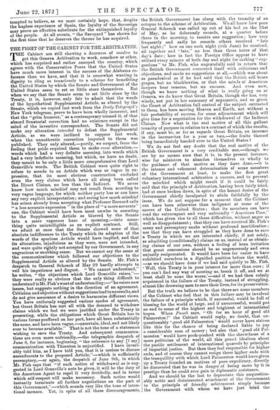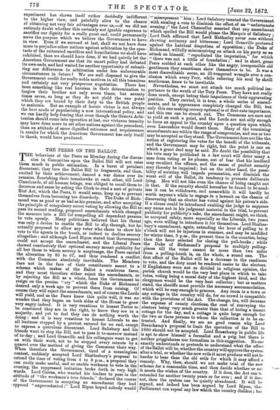have much more interest in the success of the Alabama
re-
thing quite unintelligible as an explicit contract. Still, well as disappointment ; that they can have received Mr. Fish's we admit at once that the Senate showed none of that many and peremptory snubs without profound mortification ; absolute indifference to the Treaty which its adoption of the nor that they can have struggled as they have done to save words of the spurious Article would have implied, and that a Treaty in which we are interested chiefly, if not solely, its alterations, injudicious as they were, were not intended, as admitting (conditionally) claims on us, instead of as obtain- and were quite rightly not accepted by our Government, in any ing claims of our own, without a feeling of keen irritation ungracious or snubbing sense. But we cannot say the same of that great concessions should be so ungenerously and even the communications which followed our objections to the unjustly reciprocated. It would have been far easier to have Supplemental Article as altered by the Senate. Mr. Fish's exhibited ourselves in a dignified position before the world, despatch to General Schenck of May 29 hardly attempts to —as we should have done if we had said quietly to Mr. Fish, veil his impatience and disgust. "We cannot understand," Well, this Treaty is in your interest far more than ours ; if he writes, "the objections which Lord Granville raises,"— you can't find any way of meeting us, break it off, and we at they were really so obvious that the only thing difficult to least shall be none the worse,'—and if we had then calmly understand is Mr. Fish's want of understanding;—" he raises new acquiesced in the failure of the Treaty, instead of struggling, issues, but suggests nothing in the direction of an agreement. almost like drowning men to save their lives, for its preservation.
Criticism and objection without suggestions lead to no results, and But the truth we believe to be that there are some members do not give assurance of a desire to harmonise different views, of the Cabinet who feel that in this failure may be involved You have uniformly suggested various modes of agreement, the failure of a principle which, if successful, would be full of but Great Britain has met all with the demand to withdraw blessing for the world at large, and if unsuccessful, would put claims which we feel we were justified under the Treaty in an end to some of the highest and brightest of international presenting, while the obligations which Great Britain has in hopes. When Punch says, "Oh for an hour of good old various forms proffered on her part, have all been substantially Palmerston !" the Cabinet would reply, no doubt, that un- the same, and have been vague,—uncertain, ideal, and not likely questionably good old Palmerston' would never have striven ever to become available." That is not the tone of a statesman like this for the chance of being declared liable to pay wishing to save the Treaty. And subsequent communica- a considerable sum of money ; but also that good old Pal- tions are even more unfriendly,—the telegraphic despatch of merston ' would have pooh-poohed with the shrewdness of a June 8, for instance, beginning, "the reference to any [i my] mere politician of the world, all this grand idealism about communication with Thornton is unjustified. I have invari- the pacific settlement of international quarrels by principles ably told him, as I have told you, that it is useless to discuss of impartial justice. But then they feel responsible for higher amendments to the proposed Article,"—which is sufficiently ends, and of course they cannot resign those higher ends with peremptory,—or again, the despatch of June 9th, in which the tranquillity with which Lord Palmerston would have given Mr. Fish says that "if such notice of withdrawal as is Bug- up a Treaty founded on motives of pure expediency, directly gested in Lord Granville's note be given, it will be the duty of he discovered that he was in danger of losing more by it in the American Agent to repel it very decidedly, and in terms prestige than he could ever gain in diplomatic assistance. which self-respect will make necessary. Such notice would And we should be the last to depreciate this unquestion-
instantly terminate all further negotiations on the part of ably noble and disinterested attachment of the Government this Clovernment,"—which sounds very like the tone of inten- to the principle of friendly arbitrament simply because tional menace. Yet, in spite of all• these discouragements, the Government with whom we have just tried the
tempted to believe, as we most certainly hope, that, despite the British Government has clang with the tenacity of an the hapless experience of Spain, the loyalty of the Sovereign octopus to the scheme of Arbitration. We all know how poor may prove an effective substitute for the extinguished loyalty General Schenck was called up out of his bed on the 31st of the people. At all events, " the Savoyard " has shown for of May, as he dolorously records, at a quarter before the first time that he deserves the throne he has acquired. three in the morning, to receive one suggestion ; how very frequently and sadly he records others received " late THE FIGHT OF THE CABINET FOR THE ARBITRATION. last night ;" how on one such night (Oth June) he received,
THE Cabinet are still showing a dourness of resolve to all together and "late," no less than three notes of that get this Geneva Arbitration to work, somehow or other, day's date ; how in fact the Foreign Office appear to have utilised every minute of both day and night for making " sag- which has surprised and rather annoyed the country, which he united states gestions " to Mr. Fish, who ungratefully said in return that agrees with the Conservative Peers that t
the British Government contented itself with criticisms and ference than we have, and that it is somewhat wanting in objections, and made no suggestions at al,—which was about dignity to cling so tenaciously to a scheme for benefitting as paradoxical as if he had said that the British soil bears the United States by which the Senate and Government of the grapes, but no blackberries, or that the minds of American United States seem to set so little store themselves. But lawyers bear reasons, but no excuses. And even now, when we say that the Senate seem to set little store by the though we know nothing of what is really going on at Treaty, it is, however, only fair to admit that the words Geneva, we do know that Great Britain, though she has, very of the hypothetical Supplemental Article, as altered by the wisely, not put in her summary of arguments, and so given Senate, which we copied last week from the Daily Telegraph's the Court of Arbitration full control of the subject entrusted New York telegram, prove to have been wholly incorrect, and to them, has been moving Heaven and Earth, not without a that the "grim humour," as a contemporary termed it, of that fair probability of success, for some adjournment which will absurd Senatorial correction had no existence except in the give time for a negotiation for the withdrawal of the Indirect mind of the inventive correspondent. The Senate did not Claims. Now what is the real motive of all this gallant make any alteration intended to defeat the Supplemental tenacity of purpose in relation to a contract of which the results, Article, as we were inclined to suppose last week, if any, must be, as far as regards Great Britain, an increase when the unauthentic correction imputed to them was in the income-tax for a year or two,—the fruits thereof published. They only altered,—partly, we suspect, from the being immediately handed over to the United States ? experiment has shown itself rather decidedly indifferent to the higher view, and painfully alive to the chance of obtaining not very fair advantages over us,—if we did not seriously doubt whether this certainly not ignoble eagerness to sacrifice our dignity for a really great end, could permanently serve the purpose which we believe the Government to have in view. Even if we succeed at last, shall we not have done more to prejudice other nations against arbitration by the spec- tacle of the reiterated sacrifices and humiliations we shall have exhibited, than we should have done, if we had quietly let the American Government see that its smart policy had defeated its own ends, and had waited for another opportunity of submit- ting our differences to arbitration under less unfavourable circumstances in future ? We are well disposed to give the Government credit for really noble motives in all this tenacious and certainly not very prosperous negotiation. There has been something like real heroism in their determination to forgive their brother not only seven times, but seventy times seven, so long as they do not yield the one point which they are bound by their duty to the British people to maintain. But an example of heroic virtue is not always the best mode of popularizing a new international policy, and we can hardly help fearing that even though the Geneva Arbi- tration should come into operation at last, our virtuous tenacity may have done more to set other nations against the precedent, than an attitude of more dignified reticence and acquiescence in results for which the American Government has only itself to thank, would have produced.



































 Previous page
Previous page